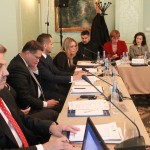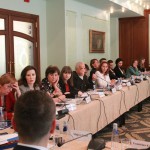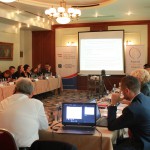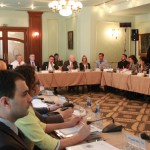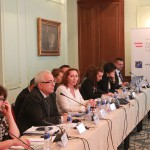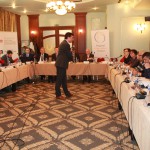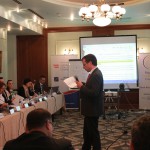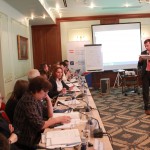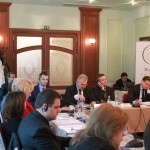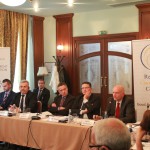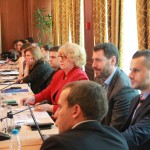Sofia 20-21 October 2016: Third Regional Meeting of Oversight Bodies for Asset Disclosure and Conflict of Interest
Regional Anti-corruption Initiative (RAI) organized the 3rd Regional Meeting of the Oversight Bodies for Asset Disclosure and Conflict of Interest on October 20-21, 2016 in Sofia, Bulgaria, in collaboration with Commission for Prevention and Ascertainment of Conflict of Interest of Republic of Bulgaria and Regional Cooperation Council, and supported by the Austrian Development Agency. The event is organized within the South Eastern Europe Regional Programme on Strengthening the Capacity of Anti-corruption Authorities and Civil Society to Combat Corruption and Contribute to the UNCAC Review Process and is a follow-up to the Regional Meetings held in Zagreb in December 2015 and Tirana in May 2016.
The main objective of the event was to strengthen regional cooperation in the field of asset disclosure and conflict of interest by discussing the mechanism enabling data exchange between the Oversight Bodies in the South East Europe. High level representatives of ministries of justice and oversight bodies from South East Europe discussed the revised draft legal instrument on exchange of data for verifying asset declarations. Additionally, representatives from Slovenian Commission for Prevention of Corruption, Regional School of Public Administration and UNDP Regional Centre/Istanbul Regional Hub participated in the Meeting.



The meeting was opened by Mr. Nikolay Nikolov, Acting President of the Bulgarian Commission for Prevention and Ascertainment of Conflict of Interest. Mr. Nikolov welcomed all participants and stressed out the importance of the regional cooperation in the field of conflict of interest prevention and asset disclosure and the need to exchange data on regional level. Mr. Nikolov pointed out the need to discuss all challenges for the implementation of the legal instrument and encouraged the participants to present the obstacles for the countries in this regard.
Mr. Davor Dubravica, RAI Chairperson, welcomed all participants and expressed gratitude to the Commission for Prevention and Ascertainment of Conflict of Interest as well as to the Regional Cooperation Council for their support and cooperation in organizing the event. Mr. Dubravica pointed out that the meeting will serve for discussion and further development of the Draft Instrument and future steps to be taken in these regards. He also reiterated that the initiative to develop a legal instrument on data exchange between Oversight Bodies in the South East Europe is welcomed by several other international organizations.
On behalf of the Regional Cooperation Council, Mr. Radu Cotici emphasized the importance of the legal instrument as a mechanism of enabling data exchange and an advanced regional cooperation of oversight bodies in the field of asset disclosure and conflict of interest. Mr. Cotici mentioned steps already taken in development of the draft Instrument and expressed gratitude to experts who worked on document, but also to all national institutions and other partners who provided valuable contribution in preparing the draft Instrument, such as European Commission, Basel Institute on Governance and the World Bank.
Mr. Tilman Hoppe, RAI Consultant, gave an overview of major updates and changes to the Draft Instrument, as compared to the version presented in May in Tirana. Mr. Hoppe presented relevant cases of the European Court of Human Rights that refer to publishing of asset declarations. Participants provided additional comments and proposals to the draft Instrument. They also discussed about how different countries proceed with asset declarations verification and what would be needed for data access, as well as the possible challenges in implementation of such instrument for each country.
The next session was composed of presentations of national case studies, with the focus on What would the Draft Agreement look like in practice?. Presentations were delivered by Mr. Paskal Boyadiiski, Member of the Bulgarian Commission for the Prevention and Ascertainment of Conflict of Interest, Ms. Dalija Oreskovic, President of the Croatian Commission for the Resolution of Conflict of Interest and Mr. Anatolie Donciu, Acting President of Moldovan National Integrity Commission.
During the afternoon session, representative of the Commission for Prevention of Corruption of Slovenia, Ms. Mojca Smid presented the best practices and mechanisms for verification of asset declarations and conflict of interest prevention in Slovenia.
Mr. Tomislav Curic, Acting Head of RAI Secretariat, presented the results of RAI’s survey on existing databases for verification of asset declarations in the region, based on questionnaire sent to all participants prior to the meeting. In particular, the survey examined what databases the oversight bodies use for verification purposes and what databases are available to the general public.
Ms. Lejla Sadiku, UNDP Istanbul Regional Hub Open Data Specialist, presented opportunities of open data for anti-corruption, with the focus on regional data exchange and public data access, including data on public procurement.
Mr. Bardo Fassbender, RAI Consultant, provided a detailed overview of necessary stages and procedures of getting an international treaty started as well as the differences between the political and the legal process in it, elaborating also on definitions and differences between the term Memorandum of Understanding and International Treaty, their advantages and disadvantages in terms of their acceptance by designated bodies.
Second day of the event was dedicated to further upgrade the draft Instrument, based on the participants’ recommendations and proposals. Furthermore, participants discussed and agreed on further steps in developing the Draft Instrument and potential ways for ensuring political commitment by countries to adopt the agreement.
The meeting was closed by Mr. Nikolov, Mr. Cotici and Mr. Dubravica, who thanked all participants for the active collaboration and contribution to the meeting’s discussion.
Main conclusions and further steps to be taken:
- RAI will revise the Draft Instrument in accordance with the comments and suggestions provided by participants of the meeting; the revised Draft Instrument will be the basis for negotiations as the next stage of the process and thus is subject to further changes if need be.
- The revised Draft Instrument will be sent by the RAI Secretariat to all participants of the 3rd Regional Meeting, as well as to participants who attended the 1st and 2nd Regional Meetings;
- The revised Draft Instrument will be shared with partners, including the European Commission, UNODC, the World Bank, OECD, the Basel Institute on Governance, ReSPA, and UNDP Regional Hub.
- The participants agreed that further support by international partners in bringing the draft Instrument to the next level would be highly welcome;
- The participants agreed that further support by the Regional Cooperation Council and other regional bodies would be highly welcome in bringing the Draft Instrument to the next level and ensuring the political commitment by the participating Governments through a platform of regional cooperation, such as SEECP;
- One of the countries in the region taking the lead in triggering negotiations would be desirable as this would speed up the entire process up to adoption;
- National authorities, including oversight bodies and Ministries of Justice, are encouraged to promote on the national level the need for strengthening regional cooperation and data exchange on asset disclosure and conflict of interest;
- Civil society organizations on the national and international level are welcome to join and to support the initiative. National authorities are encouraged to review the most suitable opportunities for consulting with civil society organizations in their countries.
For more details, please download Meeting Agenda and List of Participants.
Gallery:
RAI Secretariat
26 October 2016
∗ This designation is without prejudice to positions on status, and is in line with UNSC 1244 and the ICJ Opinion on the Kosovo Declaration of Independence.

